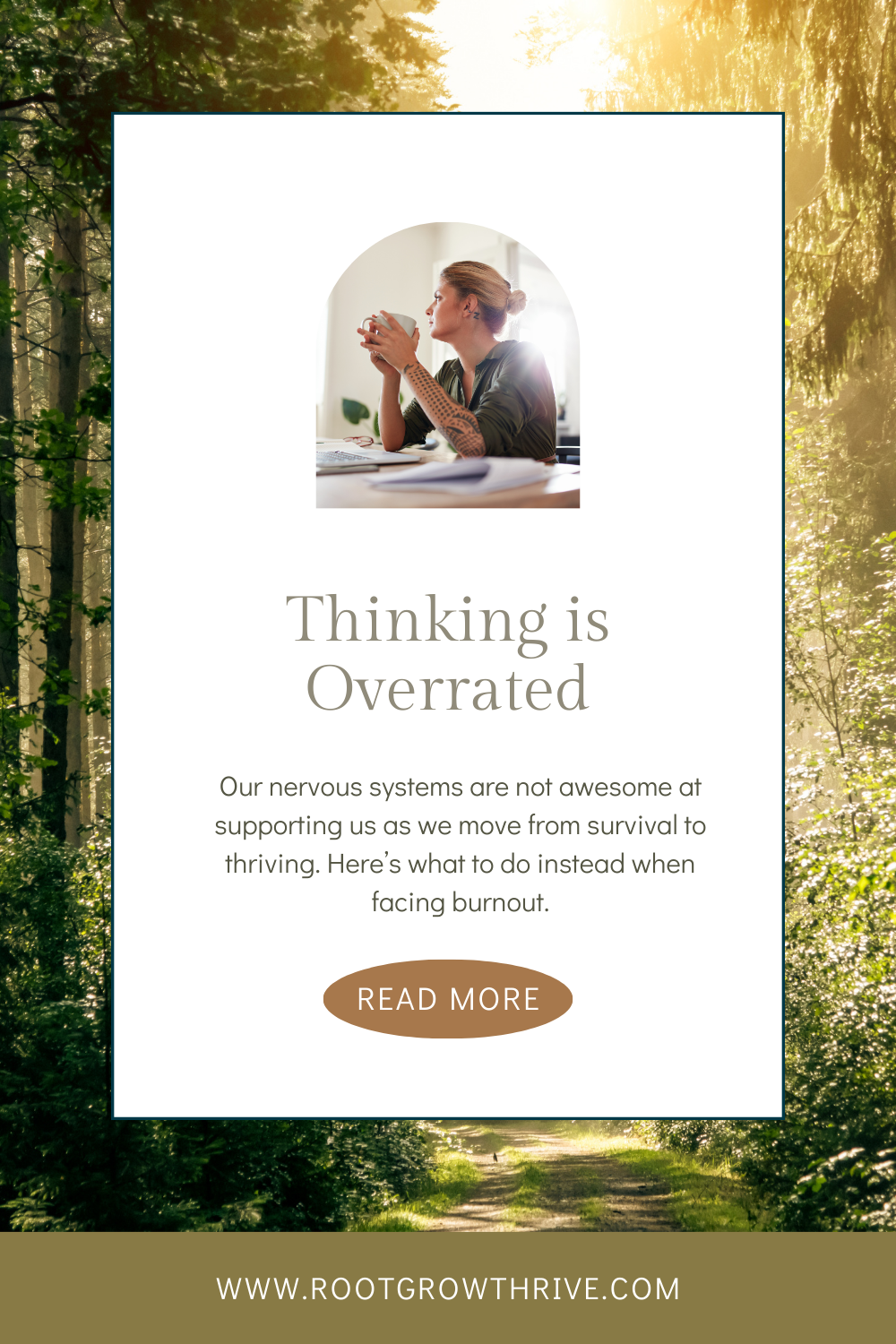Thinking is Overrated
Our brains didn’t initially evolve to think.
It evolved to keep us safe. To keep us alive. It does this by regulating our nervous system.
You know that feeling when you step out into a street, and some car comes out of nowhere and swerves and cuts you off, narrowly missing you?
Your body reacts immediately. You jump back, your heart rate increases, blood is shunted to your major muscle groups—your sympathetic nervous system is activated.
All of this is done out of awareness, and in truth, without thinking!
What happens immediately after?
You may swear, or take a deep breath, or both. THIS is often out of awareness too. You don’t consciously think, “taking a deep breath right now will help me calm down” or “swearing helps express this excess energy I feel”—instead, you do it totally out of awareness.
Yet, after we swear, take a deep breath, our bodies calm down, our parasympathetic nervous system (the part of our nervous system that calms and relaxes) is activated, and we proceed with our day.
When our sympathetic nervous systems are activated—when our nervous systems move to fight/flight/freeze mode—our bodies are driving the bus, not our brains. It is involuntary. We are at the mercy of our body's reaction—and good thing—it keeps us alive!
Problems arise when we are in an elevated stress response in our daily lives. Think about the headlines you see on a daily basis. Or how you feel when you open your inbox and see a dozen “important and urgent” emails. While you aren’t physically jumping back out of threat, your body still reacts to these mild to moderate threats the same exact way, as if there was a real, physical danger in the environment. If you were set up with a heart rate machine, you’d see your heart rate increase. If you tracked the conductivity of energy towards your major muscle groups, you’d see a marked change.
This is the reason why your shoulders stay tight, long after the threat, and can have knots in them—undischarged energy from your sympathetic nervous system response. This is the reason why people under chronic stress have higher risk of heart attacks—because of the stress their heart is under after years of unrelieved activation.
Our thinking system—that higher level brain structures that cause consciousness, thought, planning and our “humanness”—this is not just deactivated during our stress response. We thus lose direct connection to our superpower: our prefrontal cortex is what lights up when we experience deep connection through awe, wonder, creativity. It is where we can harness our selves to translate our stress into powerful meaning-making moments.
Yet we cannot do this when we are under high levels of stress. Our bodies and brains have not evolved to keep conscious awareness and executive thinking online alongside high level of nervous system activation.
All is not lost, though. We can train ourselves to notice our sympathetic activation, calm our bodies under stress, and choose to relax and engage in deactivation strategies regularly so our bodies and brains get a break. We can foster awareness in times of calm, so that we choose with intention to interact differently in the world.
So when we see threatening news headlines or open our inbox and see those urgent emails, we can choose to be aware of our activation, and intervene right away. This is called self-regulation. We can tell our bodies that it isn’t a current, in-the-moment threat to our safety and security. It isn’t a car swerving around the corner we need to jump away from. Instead, we can choose our response. We can take a deep, cleansing belly breath, relax our shoulders, drop into our bodies, and know that we are indeed safe, here and now. Then, we proceed with calm, focused awareness.
A note here--this is easier said than done, especially when you've been under immense stress, have a history of traumatic stress personally or in your family, or have limited support and have cultural or environmental conditions that do not offer the kind of safety and security that is necessary for this kind of work. Our nervous systems are extremely important for maintaining our safety, but are not awesome at supporting us as we move from survival to thriving.
I argue when we are in a safe and secure space in our lives, we are called to thrive. We are meant for more than just surviving, and to use our gorgeous thinking brains for thriving--and to nourish our contentment, joy and purpose.
PS. want some stress relief tips? check out my YouTube channel with lots of info to support your parasympathetic nervous system.



